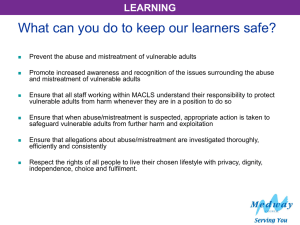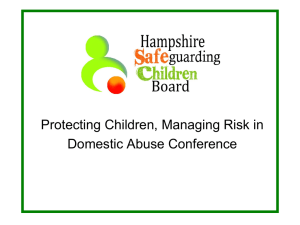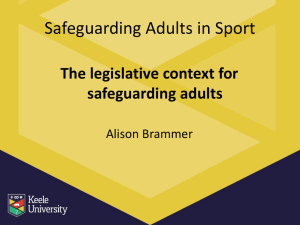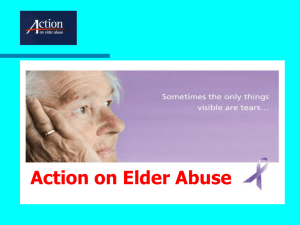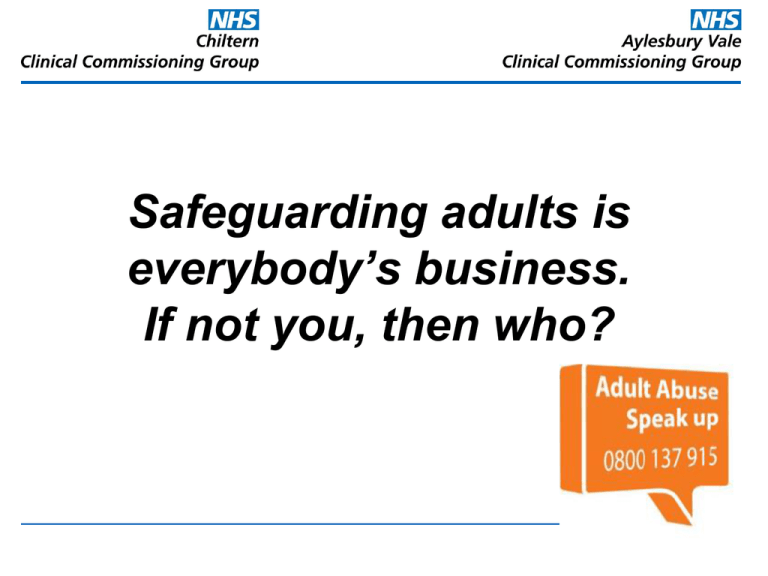
Safeguarding adults is
everybody’s business.
If not you, then who?
Safeguarding Adults – BMA Toolkit
Health professionals
Should be able to identify adults whose physical,
psychological or social condition are likely to render
them vulnerable
Should be able to recognise signs of abuse and neglect,
including institutional neglect
Need to familiarise themselves with local procedures
and protocols for supporting and protecting vulnerable
adults
Do you know about these cases?
Scale of the problem
In 2012-13 there were 1,522 safeguarding adults
referrals in Buckinghamshire, 587 went to full
assessment
The majority of people have a GP
Serious case reviews nationally and locally
almost always demonstrate GP involvement
A tiny number of alerts are made by GP
practices
Civil Law
Criminal Law
Regulations/Guidance
Mental Health Act 1983
Offences against the
person Act 1861
No Secrets 2000
Public Health Act 1984
Housing Act 1985
Theft Act 1968
PACE 1984
NHS & Community Care Act 1990
Protection from
Harassment Act 1997
Family Law Act 1996
Human Rights Act 1998
Data Protection Act 1998
Public Interest Disclosure Act 1998
Public Order Act 1986
Sexual Offences Act
2003
Domestic Violence Act 2004
(amendment 2012)
Mental Health Act 1983s
127
Mental Capacity Act 2005
Mental Capacity Act 2005 SI 2009/3112 CQC registration
s.44
Safeguarding Vulnerable Groups Act
2006
Health & Social Care Act 2008
Equality Act 2010
Fraud Act 2006
Manslaughter (common
law or corporate
homicide Act 2007)
Legislation and guidance
SI 2009/2023 Family Law Act
1996 forced marriages /
relevant 3rd party
SI 2010/781 HSC Act 08
regulated activities
Draft Care and Support Bill
• Most important piece of adult social care legislation in
60 years
• 40 statutes in one piece of legislation
• New safeguarding duties
• Adult Safeguarding Boards
Definitions
Vulnerable Adult
“Anyone aged 18 or over who is or may be in need of care services by reason of
mental or other disability, age or illness; and who is unable to take care of him or
herself or unable to protect him or herself against significant harm or exploitation”
Significant Harm
• Ill-treatment (includes sexual abuse and forms of ill-treatment that are not
physical)
• impairment of, or an avoidable deterioration in, physical or mental health
• Impairment of physical, emotional, social or behavioral development
Abuse
“A violation of an individual’s human and civil rights by any other person or
persons”
“A single or repeated act or lack of appropriate action occurring in a relationship
where there is an expectation of trust which causes harm or distress”
This includes people who have:
•
•
•
•
•
•
•
•
a mental health problem
(including dementia or memory problems)
a physical disability or illness
drug and alcohol related problems
a sensory impairment
a learning disability
an acquired brain injury
frailty or a temporary illness
What Can Practices Do?
•
•
•
•
•
•
•
•
•
Training and awareness
Information for patients
Asking questions
Consider in reviews e.g. chronic disease
Follow up non attenders e.g. Repeat
prescriptions
Carers policy
Flag records of vulnerable adults
Discuss concerns and significant events
Contribute to meetings
Practice Checklist
•
•
•
•
•
•
•
•
•
•
•
Safeguarding adults policy
Safeguarding adults lead
See the child behind the vulnerable adult
Highlight records of vulnerable adults
Information available for patients
Regular training
Significant events reviewed discussed
Concerns shared with CCG
Application of Mental Capacity Act to practice
Minimum safety criteria for staff employment
Complaints and whistle-blowing policy
How can you recognise abuse?
• There may be a perfectly reasonable rational explanation so ask some open
questions
• Remember that the carer or accompanying person may be the abuser so
may not always give a true reflection of events
• Check for corroboration from GP, community nurses or care home referral
letter, ambulance notes etc
• Look at the social history, medical history, list of medication, risk
assessments and observations
• When you have a fuller picture are you still worried?
Types of abuse
•
•
•
•
•
•
•
•
Physical
Sexual
Psychological (or emotional)
Neglect (or acts of omission)
Financial
Institutional
Discriminatory or rights abuse
(Domestic violence)
Physical Abuse
•
Is the non-accidental physical mistreatment of one person by another
which may or may not result in physical injury. It can be the use of
force that results in an unwanted change in a person’s physical state.
•
Physical violence: Hitting, slapping, pushing, kicking, shaking, scalding,
dragging, pinching hair-pulling.
•
Rough or inappropriate handling: Careless/rough handling; forcefeeding; inappropriate application of physical techniques such as
manual handling, restraint or physical intervention; involuntary
isolation or confinement.
•
Medical Mistreatment: Misuse of medication; withholding of
medication; inappropriate use of medical procedures, such as
catheterisation.
Physical
abuse
causes
injury, fear,
intimidation
and
sometimes
death
Physical Abuse - possible Indicators
•
•
•
•
•
•
•
•
•
•
•
Delays in seeking medical attention.
Shaped injuries
Multiple old or new injuries
Records of different visits for treatment
Skin infections/Inconsistent or unexplained
injuries (bruises, cuts, burns, blisters, scratches,
fractures, sprains)
ions
Weight loss
Medications withheld or omitted
Fear/reluctance to be with someone
Incontinence
Changes in behaviour, mood or usual routine,
(sleep patterns or eating habits).
Sexual Abuse
• Is the direct or indirect involvement in any sexual activity to which a person
does not give valid consent or cannot give valid consent.
• A person cannot give valid consent when they lack capacity to make a
decision or if they are coerced into activity because the other person is in a
position of authority, trust or power.
Non-contact abuse:
Indecent exposure, inappropriate looking, photography, harassment, serious
teasing or innuendo, pornography.
Contact Abuse:
• Rape or sexual assault, masturbation (of either or both persons),
inappropriate touching of breast, genitals, anus, mouth.
Sexual abuse - possible Indicators
• Bruising to inner thighs, genital or anal areas
• Persistent and inappropriate sexual behaviour
or pronounced overly affectionate behaviour
• STI or unexpected pregnancy
• Torn or blood stained clothing/bedding
• Love bites
• Obsessive behaviour/ Changed behaviour
• Difficulty sitting/standing
• Bulimia/Anorexia/Self Harm /Self neglect
Psychological abuse
• Is the use of threats, humiliation, bullying, other
verbal conduct or any other form of mental
cruelty that results in mental or physical
distress.
• Emotional abuse is any act which negatively
affects the emotional well being of a person or
impairs their psychological development.
Psychological abuse – possible
indicators
• Anxiety
• Low self esteem
• Difficulty communicating with vulnerable person
or gaining access to visit
• Deference /submission to the perpetrator
• Sleep disturbance
• Confusion
Financial abuse
• Is the unauthorised and improper use of funds,
property or any resources belonging to an
individual.
• Unauthorised would include the coercion or
misleading of an individual, or any lack of
informed consent from the individual.
Financial
abuse
can lead to
deprivation,
humiliation
and
starvation
Financial abuse – possible indicators
• Lack of basic necessities or inability to provide
for basic needs (food, rent etc.)
• Inability to retain control over home lifestyle
and/or apparently chaotic lifestyle
• Denying access to or controlling accounts
• Removal of items without consent
• Overcharging
• Theft or “borrowing”
• Unexplained financial activity
• Unexplained interest in someone
Neglect
• Poor personal hygiene or mouth care
• Malnutrition and / or dehydration and weight
loss
• Constipation
• Hypothermia
• Inappropriate and / or dirty clothing
• Category 3 or 4 pressure ulcers
• Untreated or delay in seeking treatment for
medical problems or falls resulting in injury
• Incomplete or inconsistent records of care
Neglect is degrading and undignified and
can endanger life
Institutional abuse
•
•
•
•
•
•
•
Rituals and routines
Confinements
Stark environments
Lack of stimulation
Lack of consultation
Use of restraint
Use of power/control
Discriminatory abuse
• Is the harassment, unfair treatment, exploitation or denial of
mainstream opportunities and services to individuals because
of their race, religion, culture, gender, age, sexuality or
disability.
• Discrimination can be a motivating factor in other forms of
abuse
Discriminatory abuse – possible indicators
•
•
•
•
•
Not providing food consistent with a person’s culture or beliefs
Use of derogatory names or teasing about differences
Lack of appropriate social contacts
Not allowing attendance or observance of at religious festivals
Low self esteem, confidence or expressions of low self-worth
Prevent
Prevent is concerned with safeguarding individuals at
risk of exposure to extreme ideologies, either through
personal contact or via the internet
These ideologies could be international terrorism, the
extreme right or left wing, animal rights, environmental
protest, the IRA etc
The Prevent team provide awareness sessions for
professionals working with vulnerable young people
and adults and can be delivered across the Thames
Valley at your convenience
Domestic Violence
Disclosure
What should you do if someone discloses abuse to you?
• Be calm and do not show shock or disbelief
• Listen carefully to what is being said
• Do not ask detailed or probing questions (investigator will do this)
• Ensure that any emergency action needed has been taken to ensure the
person’s safety
• Do not attempt to confront the alleged perpetrator
• Demonstrate a sympathetic approach by acknowledging regret and concern
that what has been reported has happened
• Confirm that the information will be treated seriously
• Give them information about the steps that will be taken
• Inform them that they will receive feedback as to the result of the concerns
they have raised and from whom
• Give the person contact details so that they can report any further issues or
ask any questions that may arise
• Ensure that an appropriate person within your organisation has been
notified e.g. Line Manager, Safeguarding Adults Lead
The safeguarding process - reporting
• Report the abuse
– If in doubt then discuss concerns, better to over report than to say
nothing
– Liaise with Bucks CC &/or Safeguarding Lead
– CQC?
• Fill out the SVAB or local alert form
– fax or email as instructed
– Confirm receipt of fax
• If member of staff or line manager suspected of being perpetrator refer
direct to Senior Manager
– Check whistleblowing policy?
– Public Disclosure Act 1998
The safeguarding process –
communicating and helping
• Ensure persons safety and protection
– Inform police if criminal act suspected
– Protect evidence
– Work with adult social care
• Reassure
• Explain processes
• Consent and information sharing
Case One
• Harry is 78 yrs old and lives alone in a flat
• His daughter, Elaine, is very worried about him, he has always drank
heavily but recently she feels he has worsened. She has seen bottles and
rubbish strewn over the flat. Her dad looks very thin and observed
injuries to his face she thinks are from falls. He refuses to let her take
him to hospital, which was her plan
• His daughter, upset and anxious, calls Social Services who advise her to
phone Harry’s GP Practice and discuss her concerns.
• What can the Practice do?
Case Two
• Patricia has Dementia, she is in a nursing home and she
experiences periods of agitation and confusion that make her
management difficult. Patricia refuses to take the Trazodone
that has been prescribed so staff ask you to write it up as a
covert medication which they will put in to her drink.
• What are the issues?
Summary of MCA Principles
•
•
•
•
•
Presumption of capacity.
Unwise decision making.
Practicable steps.
Best interest.
Least restrictive option
What is Capacity?
Mental Capacity is the ability to make a decision e.g.
• Daily life decisions.
• Serious or significant decisions
• Decisions that may have legal consequences.
These decisions must be viewed as
• Time specific
• Decision specific
Decisions that cannot be made
•
•
•
•
•
Divorce
Marriage
Voting
Sexual relations
Adoption
New Power - Ill treatment or neglect.
• For those who have care of someone who lacks or is believed
to lack capacity
• Also if they have LPA, EPA or are COP deputy
• If found guilty of willful neglect or ill treatment liable to be
imprisoned or fined or both
S.44 Mental capacity Act 2005
Two Stage Test of Capacity
Stage 1
Does the person have an impairment
of or a disturbance in the function of
their mind or brain?
Proceed to stage 2 only if YES to this
question.
Stage 2
Does the impairment or disturbance
mean that the person is unable to
make the decision in question at the
time it needs to be made?
A person is deemed unable to make a
decision if once given the relevant
information they cannot
Understand it
Retain it
Use or weigh it
Communicate their decision
(p44 MCA Code of Practice)
Arriving at a decision re capacity
• Identify the Decision Maker:
“The person who is most appropriate to make a particular
decision or has the specific authority to make the decision
• Reasonable belief ( on the balance of probability)
• Acts or decisions must be made in the person’s best interests
• Use a Best Interest checklist
• Evidence how the decision was arrived at.
• Record your decision, including date and time
Best Interests
The Mental Capacity Act 2005 Section 4 sets out principles to make best interests
decisions. The list is not exhaustive.
The best interest of a person must not be based merely on:
The persons age or appearance
A condition of his, or an aspect of his behaviour which may lead others to
make unjustified assumptions about what might be in his best interests
Example Checklist
•
•
•
•
•
•
•
•
•
•
•
•
•
•
Is the person likely to regain capacity?
Yes/No
If yes, is this likely to be in time to make the decision in question? Yes/No
Have all practicable steps been taken to encourage the person to participate in the
decision? Yes/No
If Yes then briefly describe
how….………………………………………………………………………………………………………………………
……………………………………………………………………
Have any statements or wishes of the person been taken in to account? Yes/No
If practicable and appropriate, have the following views been taken in to account:
Anyone named by the person to be consulted? Yes/No/Not Applicable
Anyone engaged in caring for the person? Yes/No/Not Applicable
Any Court Appointed Deputy? Yes/No/Not Applicable
The Attorney under any Lasting Power of Attorney? Yes/No/Not Applicable
Anyone interested in the welfare of the person? Yes/No/Not applicable
If Yes, name the person consulted………………………………
IMCA if no close persons
How is this the least restrictive/harmful
option?...................................................................
Best Interests
• Following Best Interests assessment where no
consensus can be reached, the Court of
Protection must be approached to resolve the
issue
Case Study
• Selima is a 75 year old lady in a residential care home.
She has dementia and she suffers periods of acute
confusion and agitation, she also suffers from Asthma. It
is October time and Selima is due a Flu vaccination which
she refused.
•
•
•
•
What are the issues?
What information do you need and from where?
What needs to be documented?
Who is the decision maker?
Case Study Two
• Sarah has complex learning and physical
disabilities. She has never been sexually active,
at her Annual Health Check should she have a
Cervical Smear Test?
• Issues?
• Documentation?
Contact details
Adult Social Care Teams
• Out of hours
0800
9997677
• central access team adult social care
01296
383204
• SVAB Team at County Hall, Aylesbury
• Duty Desk
01296 382423
• Careline
0800 137915
• Email: safeguardingadults@buckscc.gov.uk
Police 101/999
Discussion and support
Tania Atcheson
Safeguarding Lead CCG’s 07768 023100
tania.atcheson@nhs.net
Vikki Gray
Safeguarding Manager CCG’s 07909 887852
Victoria.gray3@nhs.net
Sarah Pady
Joint Mental Capacity Act Coordinator
01296 382195
spady@buckscc.gov.uk
Thank you
• Key message from today?
• Change to practice?
• Further study/training?
• Email presentation
• Visit www.bsvab.org
• Collect a Mental Capacity
Act card as you leave
Call Careline
0800 137 915


